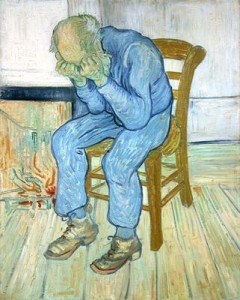 Although most people who lose a loved one recover from the emotional shock, others continue to grieve intensely for months and years afterward. Our research group is studying mechanisms that may prevent people from overcoming the pain of grief. Studies concern memory functioning and prospection – the capacity to envision one’s future. Other work concerns vocal speech characteristics that may predict emotional processing of grief memories undergoing psychological treatment for complicated grief, and deficits in emotion regulation.
Although most people who lose a loved one recover from the emotional shock, others continue to grieve intensely for months and years afterward. Our research group is studying mechanisms that may prevent people from overcoming the pain of grief. Studies concern memory functioning and prospection – the capacity to envision one’s future. Other work concerns vocal speech characteristics that may predict emotional processing of grief memories undergoing psychological treatment for complicated grief, and deficits in emotion regulation.
Related Articles:
Bellet, B. W., LeBlanc, N. J., Nizzi, M.-C., Carter, M. L., van der Does, F. H. S., Peters, J., Robinaugh, D. J., & McNally, R. J. (in press). Identity confusion in complicated grief: A closer look. Journal of Abnormal Psychology.
LeBlanc, N. J., Toner, E. R., O’Day, E. B., Moore, C. W., Marques, L., Robinaugh, D. J., & McNally, R. J. (2020). Shame and guilt after loss: Exploring the relationship between moral emotions and psychopathology in bereaved adults. Journal of Affective Disorders, 263, 405-412.
Parker, H. A., & McNally, R. J. (2008). Repressive coping, emotional adjustment, and cognition in people who have lost loved ones to suicide. Suicide and Life-Threatening Behavior, 38, 676-687.
Robinaugh, D. J., & McNally, R. J. (2013). Remembering the past and and envisioning the future in bereaved adults with and without complicated grief. Clinical Psychological Science, 1, 290-300.
Robinaugh, D. J., LeBlanc, N. J., Vulitech, H. A., & McNally, R. J. (2014). Network analysis of persistent complex bereavement disorder in conjugally bereaved adults. Journal of Abnormal Psychology, 123, 510-522.
LeBlanc, N. J., Unger, L. D., & McNally, R. J. (2016). Emotional and Physiological reactivity in Complex Persistent Bereavement Disorder. Journal of Affective Disorders,
194, 98-104.
Bellet, B. W., Jones, P. J., Neimeyer, R. A., & McNally, R. J. (2018). Bereavement outcomes as causal systems: A network analysis of the co-occurrence of complicated grief and posttraumatic growth. Clinical Psychological Science, 6, 797-809.
